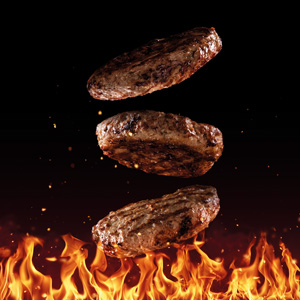 Il FARAburger di Faravelli è una proposta pensata per i consumatori più attenti all’impatto sull’ambiente e sul mondo animale
Il FARAburger di Faravelli è una proposta pensata per i consumatori più attenti all’impatto sull’ambiente e sul mondo animale
Si stima che entro il 2027 il mercato degli alimenti a base vegetale avrà raggiunto il valore di 74,2 miliardi di dollari, con un CAGR del 11,9% dal 2020 al 2027 (fonte Meticolus Research®).
Il settore sta crescendo rapidamente ovunque nel mondo e in Europa dal 2018 al 2020 il valore delle vendite è aumentato del 49% (fonte Smart Protein Project).
ProVeg International ha recentemente intervistato più di 6.000 consumatori in nove paesi europei, per identificare le priorità per il miglioramento e lo sviluppo dell’offerta, sulla base dell’esperienza dei consumatori nell’acquisto e nel consumo di prodotti a base vegetale.
La maggior parte degli intervistati ritiene che negli store non siano disponibili sufficienti opzioni a base vegetale: i consumatori vorrebbero una maggior varietà di sapori, consistenza e tipologie di prodotti.
La categoria “carne-non-carne” è in rapida crescita e risponde alle nuove esigenze e sensibilità di una fetta sempre più ampia di clienti. Il settore globale dei sostituti della carne vale 20,7 miliardi di dollari ed è destinato a crescere fino a 23,2 miliardi di dollari entro il 2024, secondo Euromonitor.
Prodotta direttamente dalle piante, come la carne animale la carne vegetale è composta da proteine, grassi, vitamine, minerali e acqua.
La carne vegetale di nuova generazione ha lo stesso aspetto, cottura e sapore della carne convenzionale. (Fonte: The Good Food Institute).
100% vegetale, il FARAburger è una gustosa alternativa al classico hamburger di carne.
Studiato e messo a punto dal laboratorio applicativo food di Faravelli il “FARAburger” è una proposta pensata per tutti i buon gustai, ma soprattutto per quei consumatori più attenti all’impatto sull’ambiente e sul mondo animale di tutto ciò che mangiamo, a cominciare dalla carne.
Le sue caratteristiche lo rendono unico; rispetto ai burger vegetali attualmente sul mercato ha, infatti, molte meno calorie (almeno il 50%) e molti meno grassi, anzi zero!
Diversamente da quanto ci si aspetterebbe, pur essendo completamente privo di grassi risulta molto succoso e con una struttura del tutto simile al classico burger di carne, senza sineresi.
Inoltre, il gusto neutro (la soia non viene minimamente percepita) e l’assenza aromi, lo rendono molto adattabile nel sapore.
Il segreto? Non si tratta di una magia, ovviamente. Il merito è tutto di una speciale miscela funzionale della linea FARA® che Faravelli produce nel suo stabilimento di Nerviano, alle porte di Milano.
Hamburger, polpette, wurstel, salsicce e polpettoni risulteranno così polposi, umidi e appetitosi che nessuno potrà credere si tratti davvero di prodotti 100% vegetali!
Cibi non solo buoni e proteici, ma anche alleati della sostenibilità ambientale.
Vuoi saperne di più? Richiedi la ricetta “segreta” a fara@faravelli.it
With FARAburger greater attention to our planet
FARAburger by Faravelli is for consumers more sensitive to the impact on the environment and the animal world
The plant-based food industry is expected to grow at a CAGR of 11.9% from 2020 to 2027 to reach $74.2 billion by 2027. (Meticolus Research®).
The industry is growing rapidly everywhere in the world, and in Europe from 2018 to 2020, the value of sales increased by 49% (Smart Protein Project).
ProVeg International recently surveyed more than 6,000 consumers in nine European countries to identify priorities for improvement and supply development, based on consumer experience of buying and consuming plant-based products.
Most respondents felt that not enough plant-based options are available in stores.
Consumers would like to have a greater variety of flavors, textures and product types.
The plant-based meat substitutes category is growing rapidly and responding to the new needs and sensitivities of a growing segment of customers.
The global meat substitutes industry is worth $20.7 billion, and is set to grow to $23.2 billion by 2024, according to Euromonitor.
Plant-based meat is produced directly from plants. Like animal meat, it is composed of protein, fat, vitamins, minerals and water. The new generation of plant-based meat looks, cooks and tastes just like conventional meat. Source: The Good Food Institute
Designed and developed by Faravelli’s food application laboratory, the “FARAburger” is a proposal designed for all gourmets, but especially for those consumers who are more sensitive to the impact on the environment and the animal world of everything we eat, starting with meat.
The 100% vegetable FARAburger is a tasty alternative to the classic meat burger. Its characteristics certainly make it unique. Compared to the vegetable burgers currently on the market, it has far fewer calories (at least 50%) and far less fat – in fact, zero!
Contrary to what one would expect, it is completely fat-free, but very juicy and with a structure similar to the classic meat burger, without syneresis.
In addition, the neutral taste (soya is not perceived at all) and the absence of flavours make it very adaptable in terms of flavour.
The secret? It is not magic, of course. It is all down to a special functional blend from the FARA® line that Faravelli produces in its factory in Nerviano, just outside Milan.
Hamburgers, meatballs, sausages and meatloaves will be so meaty, moist and appetising that no one will be able to believe that these are really 100% vegetable products!
Food that is not only good and protein-packed, but also an ally of environmental sustainability.
Want to know more? Request the ‘secret’ recipe to fara@faravelli.it









